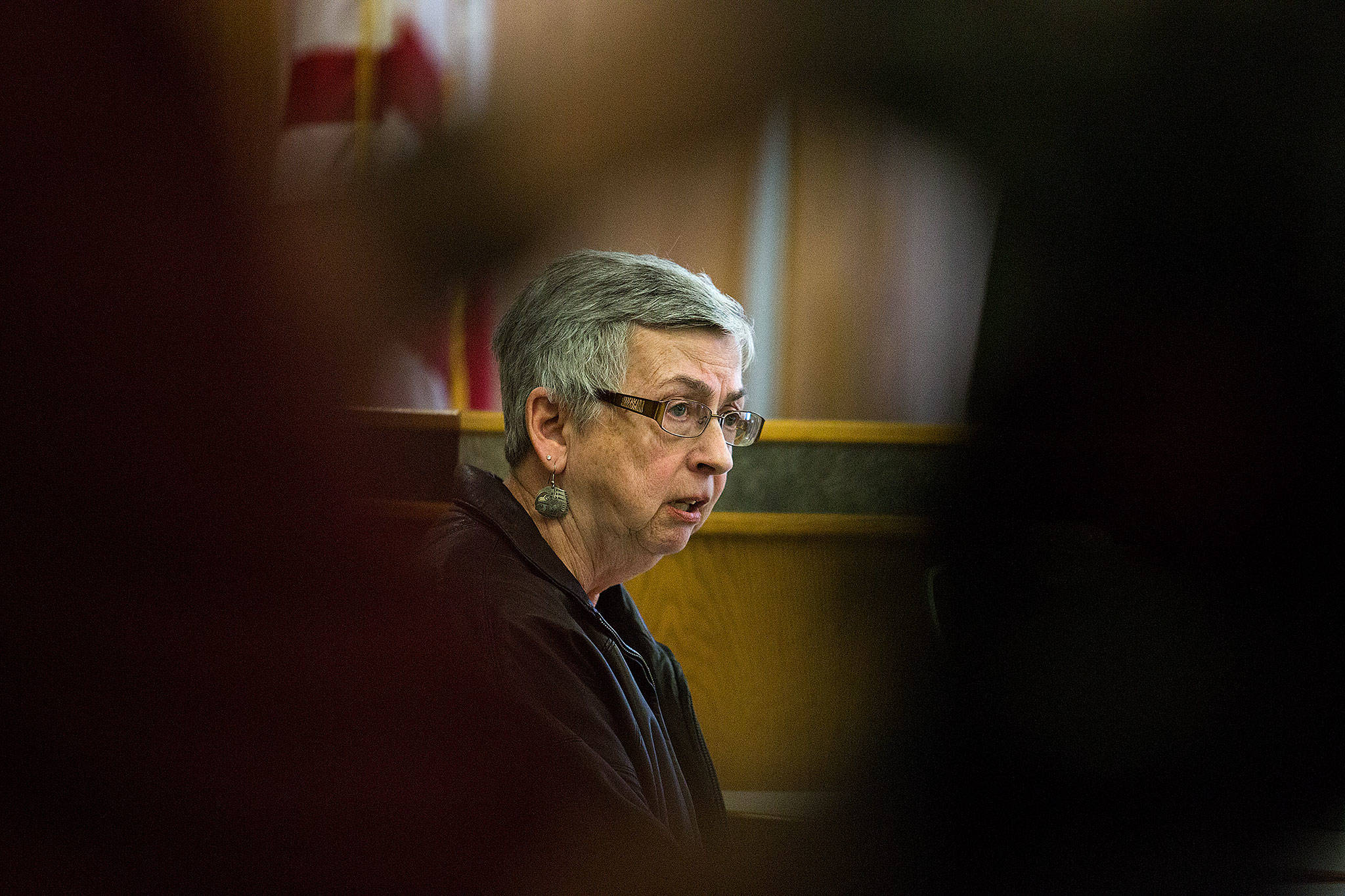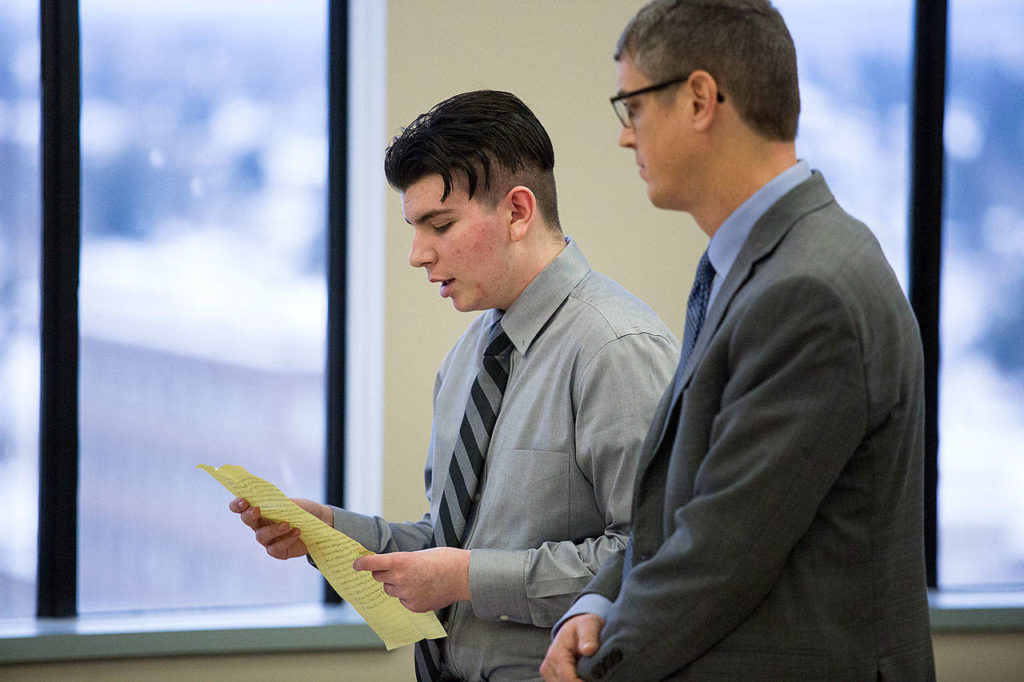EVERETT — Catherine Katsel O’Connor found her grandson’s journal at their Everett home in early 2018. He’d written out minute-by-minute plans to kill as many students as possible at his high school.
The grandma saw it was not just a fantasy. He’d taken real steps toward doing it. He’d secretly bought a Hi-Point carbine rifle, because it was a gun used in the massacre at Columbine High School, according to the journal.
The grandmother called police to stop a potential national tragedy.
On Tuesday, she asked a judge to show Joshua O’Connor mercy.
“The dark thoughts in his journal were juvenile, and his way of screaming for help,” she said, in a letter to Snohomish County Superior Court Judge Bruce Weiss. “I believe he has calmed those demons and will live a law abiding life.”
The judge declined to hand down a sentence after a three-hour hearing Tuesday. Prosecutors are seeking 23⅓ years in prison. The defense asked for 12 years.
Weiss plans to make a decision Feb. 28.
O’Connor, 19, entered the courtroom with a new haircut, a gray dress shirt and tie. He pleaded guilty in December to attempted first-degree murder, unlawful possession of an explosive and first-degree robbery, for a mini mart stickup to fund the planned carnage.
In a sentencing memorandum, the defense focused on the severe child abuse O’Connor suffered in his early years, when his mother lived with undiagnosed and untreated mental illness.
“Joshua was the victim of repeated trauma, including abandonment, abuse and neglect, and he is a prime example of an eighteen-year-old who was stunted in his maturity and understanding,” defense attorney Michael Sheehy wrote.
Two deputy prosecutors, Andrew Alsdorf and Laura Harmon, argued that putting O’Connor in prison for a long time was necessary to protect the public.
“Had the defendant completed his intended crime, there would be no sentence, even death, that would have brought any semblance of appropriate proportionality to the Court’s sentence,” wrote the Snohomish County prosecutors.
It was not an impulsive crime, but a calculated one, Alsdorf said.
It’s not disputed that O’Connor had a traumatic childhood, or that he bottled up his resentment. His mother started leaving the boy at home alone around age 5, according to stories compiled by the defense.
Multiple times, with no warning, the mother packed up and moved the kids to another state: Washington, Alaska, Arizona.
O’Connor and his sisters did not have food, running water or electricity at home in Arizona, over spans of months. O’Connor’s mother believed microphones were hidden in the home. She threw away toys if she thought they were bugged. O’Connor shared a bed of blankets on the floor with his sisters.
At night, his mother woke the kids to speak in tongues, or to order them to speak in tongues.
Once when O’Connor had lice in the sixth grade, he missed months of school while his mother insisted it could be treated by prayer alone. The mother kept him out of school for two years, out of fear that his grandparents would find him and fight for custody, according to a psychologist hired by the defense.
As a child in Arizona, O’Connor would wander out of the apartment to beg for food and water.
One day he knocked on the door of a neighbor, Heather Erwin Salamone, a medical student. She got to know the kids, let them take baths at her home and gave them food. The neighbor befriended the mother, too, but ended up calling Child Protective Services on her five times. O’Connor’s mother would not pay her rent, and got evicted many times in the same neighborhood — leaving urine, feces and general squalor in the abandoned homes, Salamone said.
“(O’Connor) was in such a state of despair, not knowing what to do,” she said.
The mother often threatened to kill herself and the kids, one of O’Connor’s sisters testified Tuesday. The grandparents were eventually granted custody of the boy in 2014. They moved to Everett, with the goal of giving Joshua a fresh start.
“How are we to understand that this … adolescent, with no history of violence or aggression of any kind, would plan and take concrete steps toward a mass shooting at his school?” wrote Dr. Delton Young, the defense’s forensic psychologist.
Three things converged, Young testified on Tuesday. A history of trauma and neglect undermined the boy’s personal development; he was still young and developing; and he lived with major depression after a concussion and skull fracture in September 2017. He suffered the head injury when he ran away from his grandparents and traveled down the West Coast. He was a passenger in a car months later in Arizona, when a friend got into a serious crash.
O’Connor was flown back to Everett, where he wrote in a red spiral journal. Those entries showed a fixation on suicide and mass murder, according to charging papers. He idolized school shooters.
Over months, he wrote pages and pages of plans to kill his classmates.
“Where do I start?” read a note from November 2017. “Sure I can talk about my (messed) up childhood, but who really cares? I know what you’re wondering. ‘Why did you do it?’ I don’t know.”
The last entry recounted a robbery on Casino Road. O’Connor stuck the barrel of his rifle in the face of a convenience store clerk. The heist was supposed to help cover the costs of an arsenal for the massacre. The next day, his grandma found the rifle hidden in a guitar case. She had read the alarming entries in the journal, too, hours earlier. Everett police found that he was learning to make homemade explosives.
“It would be absurd if law enforcement were not legally permitted to intervene given these facts,” the defense attorney wrote. “However, we have no crystal ball. No (one) can be certain that Joshua would have carried out his journaled plans.”
Sheehy argued that O’Connor did not grasp the impact his actions would have on the lives of innocent people. He has been profoundly relieved, Young wrote, that he did not carry out the horrific deed.
O’Connor said one thing the doctor had never heard from a jail inmate that he was asked to evaluate.
“He feels very much better now than he has felt in his whole life,” Young said Tuesday. “This is because he was in a … relatively secure place for the first time in his life.”
O’Connor’s grandmother has kept in touch with him through phone calls to jail.
“‘Grandma, I wish you’d talked with me before you’d called police,’” he said, according to her. “He didn’t say why.”
At the end of the hearing Tuesday afternoon, the judge returned to his chambers. Attorneys paused and realized the court hadn’t heard from O’Connor. All rose again. The judge returned, apologized and asked the defendant if he’d like to speak.
O’Connor read from a letter, saying sorry to his family, his classmates and the mini mart clerk. He said he was ashamed of the disturbing things he’d written. In the past, he used a journal as an outlet, to cope with depression. He was having nightmares about his childhood and felt like a social outcast, when the entries took a dark turn.
He was glad, he said, that his grandmother intervened when she did.
“She’s the true hero in all of this,” he said. “She saved my life, and for that, I love her.”
Caleb Hutton: 425-339-3454; chutton@heraldnet.com. Twitter: @snocaleb.
Talk to us
> Give us your news tips.
> Send us a letter to the editor.
> More Herald contact information.


























